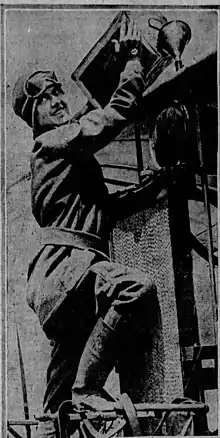Helen Hodge Harris | |
|---|---|
 | |
| Born | Helen Hodge August 2, 1892 Omaha, Nebraska, United States |
| Died | 1967 (aged 74–75) Pomona, California, United States |
Helen Hodge Harris (1892-1967) was among the first women to earn a pilot's license.[1] She was therefore one of the few women among the Early Birds of Aviation. In addition she became a proponent of flight safety.[2] She later became supervisor of a machine shop.[3]
Early life and first marriage
Hodge was born in Omaha, Nebraska on August 2, 1892.[1] She was educated at the Brownell-Talbot School (then Brownell Hall)[3] before moving to Oakland, California with her family.[4] They appear to have settled in Oakland by roughly 1909, when she married Ralph Newbre.[1] In June 1916, Hodge filed for divorce, claiming Newbre had been unfaithful.[5] A July article mentions her living with her father, and she seems to have reclaimed her maiden name.[4] However, it appears that they may have reconciled: a 1919 article refers to the Newbres as husband and wife,[6] and the book Before Amelia: Women Pilots in the Early Days of Aviation seems to imply that they stayed together until Ralph Newbre's death in the 1930s.[1]
Aviator
Hodge and her twin sister, Florence "Dot" Hodge,[7] took flying lessons together at Silas Christofferson's school in Redwood City, California,[4] after being initially rejected due to their gender.[1] Their instructor was aviator Frank Bryant,[8] who taught them to fly on a Curtiss-type biplane.[1] A San Francisco Examiner profile written in July 1916 described Helen as "the more venturesome of the couple".[4] Their father, J.B. Hodge, reportedly disapproved of them learning to fly, but "accepted the situation philosophically."[4]


Hodge trained at the Christofferson school for six months.[8] During one flight while Hodge was at an altitude of 1500 feet, her plane's motor mount broke, causing the motor to come loose.[6] Hodge managed to land safely, "much to the surprise of even her teachers."[6]
Hodge's first independent flight was made over San Francisco Bay on August 19, 1916,[9] and she received her pilot's license on November 12, 1916.[8] At the time, she planned to become an exhibition flyer.[8] Though she did perform several exhibition flights for the Christofferson school, most of her flights appear to have been simply for her own pleasure.[1] Hodge was the eleventh female pilot in the United States to receive her license,[1] and possibly the last American woman to become a licensed pilot before the start of World War I.[1] During the war, she was a flight instructor for American cadets.[1]
Later life and death
Hodge married Frank Harris in 1937 after moving to Los Angeles.[3] There, she opened a machine shop specializing in airplane tools.[3] She supervised a crew of twenty men and fourteen women,[3] and could operate machinery herself as needed.[1] Frank Harris had passed away by 1950.[3] Hodge died in Pomona, California, in 1967.[1]
References
- 1 2 3 4 5 6 7 8 9 10 11 12 Eileen F. Lebow (2002). Before Amelia: Women Pilots in the Early Days of Aviation. Potomac Books, Inc. pp. 415–416. ISBN 978-1-61234-225-2.
- ↑ Chicago Tribune article on the Early Birds
- 1 2 3 4 5 6 Early Aviators site
- 1 2 3 4 5 Kruckman, Arnold (2 July 1616). "Flying School Lures World". The San Francisco Examiner. Retrieved 12 April 2019 – via newspapers.com.
- ↑ "Too Many Rivals: Wife Quits The Race". Newspapers.com. Retrieved 2019-08-26.
- 1 2 3 "Mrs. R. B. Newbre". Newspapers.com. Retrieved 2019-08-26.
- ↑ "Miss Hodges Does Fancy Flight and Dips at Redwood". The San Francisco Examiner. 18 June 1916. Retrieved 12 April 2019 – via newspapers.com.
- 1 2 3 4 "Daring Girl Gets License". The San Francisco Examiner. 14 November 1916. Retrieved 12 April 2019 – via newspapers.com.
- ↑ "Girl Makes Her First Air Flight". Newspapers.com. Retrieved 2019-08-26.